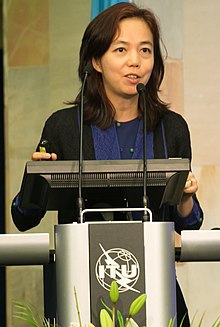AI for Good
| AI for Good | |
|---|---|
 | |
| Venue | Online, ITU, Palace of Nations |
| Location(s) | Geneva |
| Country | Switzerland |
| Most recent | 2021 |
| Attendance | 20,000 (2020) |
| Organised by | ITU, UN |
| Website | https://aiforgood.itu.int/ |
AI for Good is a year round digital platform of the United Nations, where AI innovators and problem owners learn, discuss and connect to identify practical AI solutions to advance the UN SDGs. The impetus for organizing global summits that are action oriented, came from existing discourse in artificial intelligence (AI) research being dominated by research streams such as the Netflix Prize (improve the movie recommendation algorithm).[1] AI for Good aims to bring forward Artificial Intelligence research topics that contribute towards more global problems,[2][3] in particular through the Sustainable Development Goals. AI for Good came out of the AI for Good Global Summit 2020 which had been moved online in 2020 due to the COVID-19 Pandemic. AI for Good is organized by the Standardization Sector of ITU (ITU-T). Since moving online, AI for Good developed into three main programme streams: Learn, Build, and Connect. AI for Good also helps organize ITU's Global Standards Symposium.
Online Platform[]
In 2020 the Global Summit was moved to online. In 2022 this as moved the "Neural Network" platform.[4] Speakers include:[5]
|
Global Summit 2019[]
The third AI for Good Global Summit took place from 28 May to 31 May, and gave rise to the ITU Focus Group on Artificial Intelligence for Autonomous and Assisted Driving with several Day 0 workshops and VIP events having taken place on May 27.[6] Some of the speakers included:
|
Global Summit 2018[]

The second AI for Good Global Summit took place from 15 to 17 May 2018 at the ITU headquarters in Geneva, Switzerland and generated 35 AI project proposals[7] including the ITU-WHO Focus Group on Artificial Intelligence for Health with the World Health Organization.[8][9][10] Speakers included:[11]
|
The ITU also relaunched its Journal ICT Discoveries during the 2018 Global Summit, with the first edition being a special on Artificial Intelligence.[12]
Global Summit 2017[]

The first AI for Good Global summit took place from 7 to 9 June 2017. Speakers at the event included:[13] [14]
One of the outcomes of the 2017 Global Summit was the creation of an ITU-T Focus Group on Machine Learning for 5G.
Related applications[]
Several similar terms have been used to describe related applications of AI to global issues. These include "AI for Earth", referring specifically to environmental applications;[15][16] "Humanitarian AI", referring to applications for humanitarian ends;[17][18] and "AI for Healthcare".[19]
References[]
- ^ "AI for Good Global Summit 2018". 17 May 2018. Archived from the original on 2019-09-23. Retrieved 1 June 2018.
- ^ Butler, Declan (2017-06-06). "AI summit aims to help world's poorest". Nature. 546 (7657): 196–197. doi:10.1038/546196a. ISSN 0028-0836. Archived from the original on 2019-04-30.
- ^ "How Can We Optimize AI for the Greatest Good, Instead of Profit?". www.technologyreview.com. Retrieved 2018-06-29.
- ^ "Press Release - Artificial intelligence turbo-charges AI for Good". ITU. Archived from the original on 2022-02-16. Retrieved 2022-02-16.
- ^ "2020 Digital Programme". AI for Good Global Summit 2020. Retrieved 2020-08-07.
- ^ "Day 1, 28 May 2019 Programme". AI for Good Global Summit. Archived from the original on 2019-11-05. Retrieved 2019-05-28.
- ^ "ITU annual global summit generates 35 pioneering AI for Good proposals | OpenGovAsia". www.opengovasia.com. Retrieved 2018-06-29.
- ^ Bradley, Simon. "AI has 'enormous' potential to transform health sector". SWI swissinfo.ch. Retrieved 2018-06-29.
- ^ "An AI can now tell how malnourished a child is just from a photo | New Scientist". www.newscientist.com. Retrieved 2018-06-29.
- ^ ITU (2018-10-02). "Artificial Intelligence for Health: ITU and WHO call for proposals". ITU News. Retrieved 2019-06-21.
- ^ "Meet the Experts". www.itu.int. Archived from the original on 2018-12-14. Retrieved 2 June 2018.
- ^ "The impact of Artificial Intelligence". www.itu.int. Archived from the original on 2019-05-24. Retrieved 2018-07-03.
- ^ "AI for Good Global Summit – Speakers". ITU. Retrieved 2 June 2018.
- ^ ITU. AI for Good Global Summit 2017 Report. ITU (Report). Retrieved 25 June 2018.
- ^ Society, National Geographic. "RFP: AI for Earth Innovation". www.nationalgeographic.org. Retrieved 2019-03-10.
- ^ "Microsoft AI for Earth". www.microsoft.com. Retrieved 2019-03-10.
- ^ "AI for Humanitarian Action". www.microsoft.com. Retrieved 2019-03-10.
- ^ "Humanitarian AI (Cambridge, MA)". Meetup. Retrieved 2019-03-10.
- ^ Wang, Yongjun; Shen, Haipeng; Dong, Qiang; Wang, Yilong; Ma, Sufeng; Li, Hao; Dong, Yi; Zhi, Hui; Jiang, Yong (2017-12-01). "Artificial intelligence in healthcare: past, present and future". Stroke and Vascular Neurology. 2 (4): 230–243. doi:10.1136/svn-2017-000101. ISSN 2059-8688. PMC 5829945. PMID 29507784.
External links[]
- Technology conferences
- Business conferences
- Artificial intelligence conferences
- United Nations conferences
- Switzerland and the United Nations